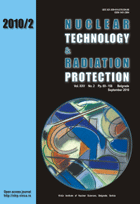
NON-DESTRUCTIVE TECHNIQUE TO VERIFY CLEARANCE OF PIPES

Vol.
XXV, No. 2, Pp. 69-156
September 2010
UDC 621.039+614.876:504.06
ISSN 1451-3994
Pages: 133-137
Authors: Anastasia Savidou, Ion E. Stamatelatos
AbstractA semi-empirical, non-destructive technique to evaluate the activity of gamma ray emitters in contaminated pipes is discussed. The technique is based on in-situ measurements by a portable NaI gamma ray spectrometer. The efficiency of the detector for the pipe and detector configuration was evaluated by Monte Carlo calculations performed using the MCNP code. Gamma ray detector full-energy peak efficiency was predicted assuming a homogeneous activity distribution over the internal surface of the pipe for 344 keV, 614 keV, 662 keV, and 1332 keV photons, representing Eu-152, Ag-118m, Cs-137, and Co-60 contamination, respectively. The effect of inhomogeneity on the accuracy of the technique was also examined. The model was validated against experimental measurements performed using a Cs-137 volume calibration source representing a contaminated pipe and good agreement was found between the calculated and experimental results. The technique represents a sensitive and cost-effective technology for calibrating portable gamma ray spectrometry systems and can be applied in a range of radiation protection and waste management applications.
Key words: research reactor, decommissioning, primary cooling system, clearance, MCNP code, key radionuclides, pipe
FULL PAPER IN PDF FORMAT (525 KB)
Last updated on September, 2010